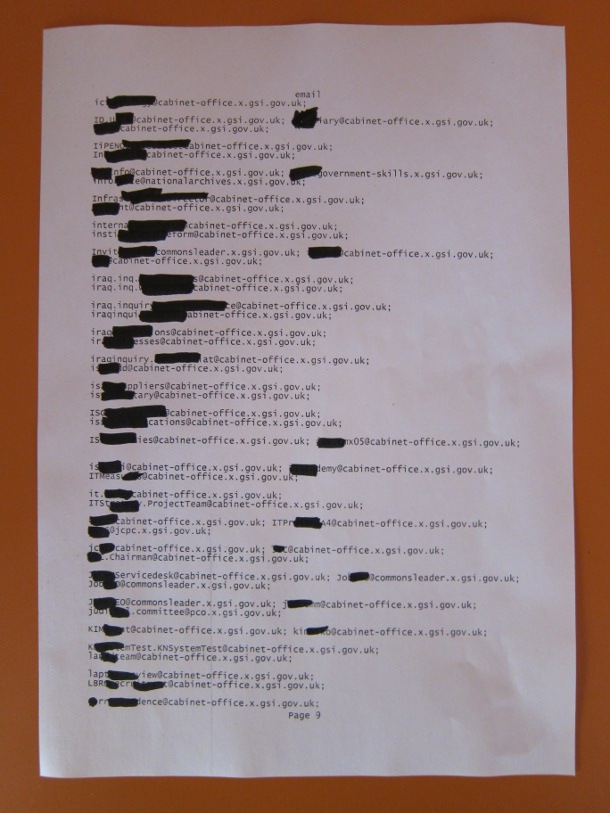The Thick of IT

The misdirected email is a staple of modern politics and, therefore, of modern political satire. One badly forwarded message can contain within itself enough evidence to bring down a government, nicely wrapped in confirmation of origin and, if you're lucky, some juicy asides.
The latest TV show to use the idea is The Thick Of It, noted for world-class swearing, excruciating incompetence, a bravura ensemble performance, and the unmistakable tang of truth (*).
Ah yes, truth. For today, I have received just such a misdirected email. It's not in itself much of an email - all it is, is a request for anyone who wants to keep their email address to reply prior to a systems upgrade - but it does come from an interesting place, the Cabinet Office. And it comes with some interesting stuff.
You know, because you've had them in the past, that occasionally people send emails to multiple recipients and don't use the bcc: field - that way, you get to see everyone else who's on the mailing list. It's not just email newbies who get that wrong: professional communicators, such as PRs, and IT support experts, such as our new friend @cabinet-office.x.gsi.gov.uk, can also press the wrong button. And if they do that with the entire email list of @cabinet-office.x.gsi.gov.uk... Furthermore, if there's a bad redirect in place - or just one external email address on one group email address in the bunch - it can all escape.
In case you didn't guess, ZDNet UK now has hundreds of Cabinet Office email addresses, including plenty with embedded codenames (Rainbow? Pygmalion?) about which we may only wonder.
The email in question was forwarded to me by Adrian Mars, erstwhile blogger for ZDNet UK and consultant to various people and organisations on the matter of IT. It was one of these which sent him the email, asking whether it was legitimate or in some way dangerous, and how it might have happened.
Mars phoned the Cabinet Office, who confirmed that it was real -- "The ones in that 'to' field were only stuff that appeared in our global address book, they are all confidential email addresses". They're going off to try and find out how it happened. Our guess is that there was a mis-spelled email in one of the lists referenced by the giant cc, and out it popped.
It would be very bad, not to say potentially illegal, to publish these email addresses, so we won't. That's not just us being scared of people with atomic weapons (although we are): there's no particular public interest in knowing how to email the people who let you book rooms in Number 10, and every danger that the list would attract the attention of people who like trying to install malware.
So, we're going to do the decent thing and destroy it - even if it means missing out on an unhealthy lashing from Malcolm Tucker's tongue. The lesson is, even if you've got the most fiendish firewall and packet-inspecting sniffing machinery in the universe and security policies coming out of the wazoo, one slip of the finger can blow the gaff wide open.
Wouldn't have it any other way.
(Oh, OK - here's one of twenty pages of email addresses, with bits coyly blanked out. They really do control nukes from Number 10, you know. But we don't think they're on the email list)

(*) And of course, being co-penned by Simon Blackwell, who once worked with myself and reviews ed Charles Mclellan on PC Magazine. He gave up that good, solid job to take up a comedy writer's bursary from the BBC - and for what? The odd Oscars ceremony? Fool.